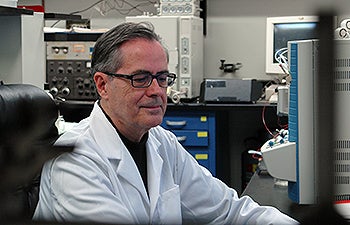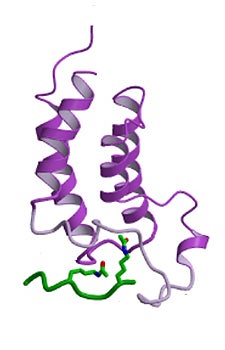Industry and Academe Team Up
The California Institute for Biomedical Research (Calibr), a nonprofit organization founded by renowned chemical biologist Peter Schultz, has launched a research collaboration with USC Dornsife.
The partnership will expedite the translation of biomedical research at USC into new therapeutic drugs.
Based in San Diego, Calif., Calibr’s interdisciplinary team works with scientists throughout the world to turn research proposals into actual drug candidates.
“Calibr is very selective in its academic partnerships,” said Charles McKenna, professor of chemistry, and vice dean for natural sciences. “This partnership is an important recognition for drug discovery efforts moving forward at USC Dornsife.”

Charles McKenna’s team will work with Calibr to perform an in vitro screening on a new protein target, in search of a small molecule able to inhibit its function. Photo by Ben Pack.
McKenna’s team will work with Calibr to perform an in vitro screening on a new protein target, in search of a small molecule able to inhibit its function.
The team consists of main collaborators Carlo Petosa of the Institute of Structural Biology (IBS) and Jerome Govin of the French Alternative Energies and Atomic Energy Commission (CEA), both based in Grenoble, France. Elena Ferri, a Ph.D. candidate in McKenna’s laboratory, and Flore Mietton, a postdoctoral researcher visiting from CEA, are also taking part in the Calibr collaborative research.
The protein target they are researching belongs to a family called bromodomains, which specifically recognize acetylated lysines on histones — highly charged proteins closely associated with DNA molecules. Bromodomains regulate gene transcription — or when genetic information is copied from DNA to RNA, resulting in a unique protein formation.
Bromodomains play major roles in inflammation and various types of cancer, viral replication and gametogenesis.
Calibr has a state-of-the-art small molecule screening system and a library of almost 1 million drug-like screening compounds. Screening methods include the use of sophisticated robotics — making it possible to process thousands of experiments daily.

McKenna’s laboratory is researching bromodomains, seen here, which regulate gene transcription — or when genetic information is copied from DNA to RNA, resulting in a unique protein formation. Image courtesy of Elena Ferri.
“We’re searching for a unique compound that will bind strongly and selectively to the protein target,” McKenna said. “It’s a fishing expedition: our protein target is the bait and the library molecules are the fish.”
Calibr research on new medicines to address major unmet needs has resulted in a number of awards, including most recently a Translation Award from the Wellcome Trust to develop a novel semi-synthetic antibody-based immunotherapy to treat hormone-refractory prostate cancer, setting a favorable precedent for the new USC collaboration.
For Ferri, the chance to work at Calibr doing high-throughput screening is an incredible opportunity.
“It’s not every day in an academic context when you have access to a library of 1 million compounds,” Ferri said. “Or can perform screening on such a large scale using robots. This will greatly facilitate the discovery of new bromodomain inhibitors and give a considerable boost to my research.”